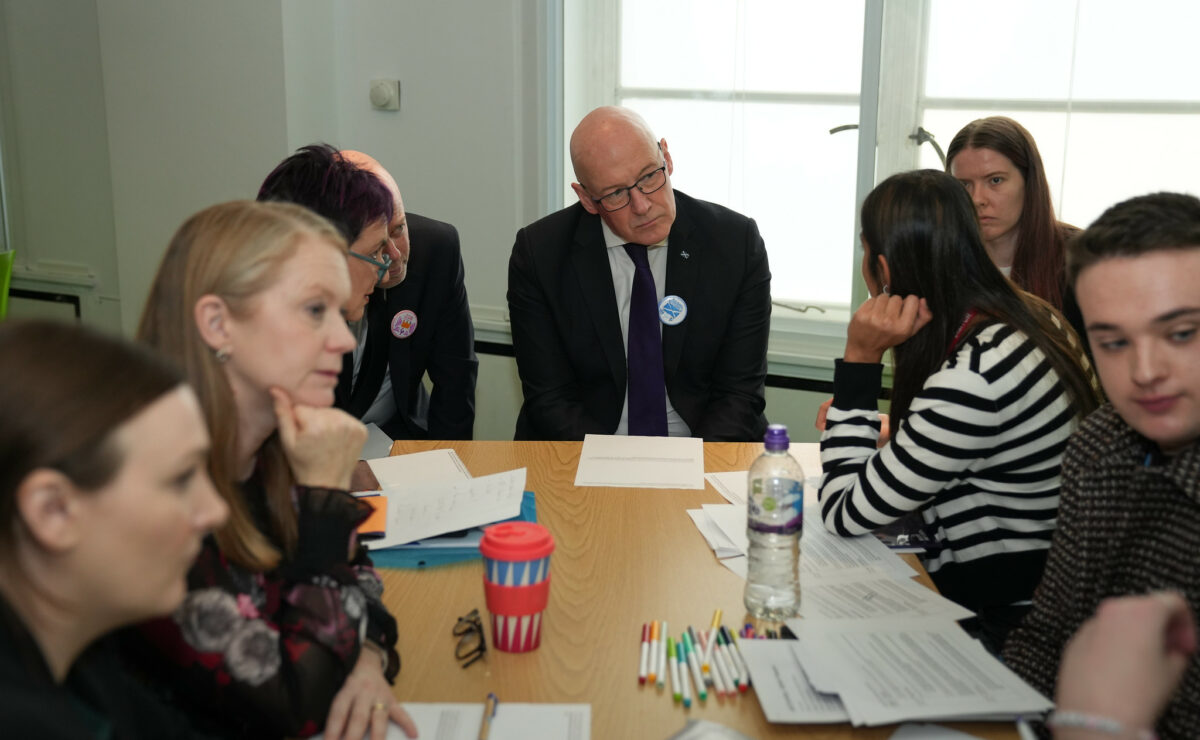In November 2025, Jack Anderson MSYP and Rajsee Saraf MSYP gave a speech to the First Minister and their Cabinet on ending gender-based violence at the Annual Cabinet Meeting with Children and Young People.
Jack and Rajsee called on Scottish Government to:
- Introduce a universal and mandatory class to the school curriculum on gender equality, digital literacy and online safety, designed by and for young people so they know how to recognise and respond to harmful content.
- Develop a long-term, intersectional strategy that embeds lived experience into all decision-making and policy creation across Scottish Government.
- Make misogyny a hate crime and protect marginalised and vulnerable communities through this legislation.
You can read their speech below:
Jack
Tackling gender-based violence has been at the forefront of the Scottish Youth Parliament’s work for years. In 2023, MSYPs passed a Motion recognising that many girls and women feel unsafe in public spaces. The following year ending gender-based violence was chosen by our membership of one of our national campaign priorities.
Since then we have made significant progress. MSYPs now sit on the Equally Safe Joint Strategic Board; SYP has engaged in meetings about the Gender Strategy; and we’ve met with the Violence Against Women and Girls Unit on the Equally Safe Youth Engagement Programme.
However, I’m sure we all accept that there is still much work to do. Too many women and girls continue to feel unsafe in their community. Too many women and girls continue to be victims to this violence. Too many women and girls continue to be let down by the justice system. Too many women and girls still need action.
As a young man, I know how important it is to engage men and boys on this topic. Gender based violence is not a women’s issue – it is a societal problem that demands a response from all of us.
That response must begin with early intervention through better education in schools.
We know that gender-based violence does not begin in adulthood. It starts with the ideas and attitudes we learn as children and young people. When schools ignore conversations about respect, equality and consent, harmful stereotypes go unchecked. When was the last time you heard someone say ‘they didn’t mean it’, ‘it was just a joke’ or even ‘they’re not like that’? That is gender based violence – it can be subtle, systemic and normalised until we call it out.
By teaching empathy, mutual respect and the value of every human being – we build a generation that stands up against violence instead of accepting it. That’s what can be achieved by adding this topic to the national curriculum. But to be effective, it needs to be mandatory, like maths or English and taught universally in every school across Scotland. Young people must also be involved in designing the content to ensure it is relevant, impactful and meaningful.
Young people are experts in their own experiences – take the digital world for example. The growing influence of social media means that young peoples attitudes and behaviours are being shaped differently today than they were even 5 or 10 years ago. The rise in influencers like Andrew Tate are infecting boys phones with harmful content and outdated stereotypes. The young people of today know this better than any other generation. Without proper guidance and safeguards, these spaces will normalise abuse. By teaching digital literacy and online respect students will be better able to navigate social media responsibly, identify misinformation, and challenge gender-based violence and harassment when they see it.
Education is about giving young people the power to take action. Education is able giving young people the power to change society for the future. By teaching men and boys about the power of speaking out, we can break the silence and give them the confidence to challenge the culture that allows abuse towards women and girls to continue. As a young man, I know how important that is.
Rajsee
Growing up as a young woman of colour, you learn a dual consciousness. You learn the map of safe streets that every woman knows, but you also learn to navigate a different set of shadows, the biases and stereotypes that can make you feel invisible to the systems designed to protect everyone else
The ability to simply live in a safe world should not feel like a constant negotiation.
Jack has just outlined the vital cultural change we need, the education and the shift in attitudes that will protect the next generation. My focus is on what we must do now to support the survivors living with the consequences of the culture we have today, and to build a justice system that does not fail them.
One thing that affects all survivors is the long-term impact of trauma. It echoes through their education and mental health opportunities for years after the violence itself. Our response must be just as long-lasting.
So, this is what we have to suggest. We need a proactive long-term, intersectional strategy that also supports survivors and is built into the very fabric of government.
We suggest this strategy ensures consistent progress on robust, inclusive legislation, specifically by making misogyny a hate crime in a way that is explicitly inclusive of trans people and all marginalised genders. 78% of young people across Scotland agree with this policy, as highlighted in our manifesto, Dear Scotland’s Future, a young woman from Fife commented “I regularly have the fear of going out, especially when it’s dark”
The need for a commitment to the intersectional lens through the National Advisory Council to become transparent with communication and produce tangible outcomes along with the new Gender Strategy is necessary, so the specific needs of the vulnerable are designed into our systems, not added as an afterthought.
So, if we complemented Jack’s vision for prevention with a system of support and justice, the finest measures in place, what would happen?
If all survivors had access to guaranteed, long-term, specialist support, we would see a generation not just surviving but thriving. If we had inclusive and specific legislation, marginalised young people would finally feel protected by the law, and we could hold perpetrators accountable. Additionally, the preventative nature of the policy will lead to a reduction in the number of perpetrators altogether.
Recalling the examples that Jack asked you to think about at the start of his speech, I want you to keep them in mind as you approach this strategy. If every policy was built through an intersectional lens, we would stop leaving disabled women, young people of colour, and LGBTQ+ individuals behind. We would build Scotland where safety is not a privilege, but a fundamental right.



